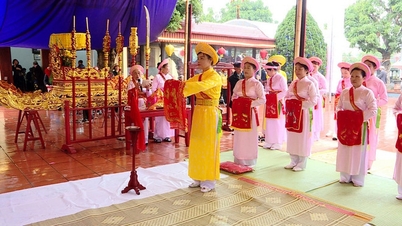TP - Just starting her first year of university, Chu Thi Xuan, a student at Hanoi Medical University, is worried about the long road ahead in her medical studies (general practitioner). Her family belongs to the near-poverty group in a commune of Quynh Luu district, Nghe An province, and her parents' income depends on a small amount of farmland and the weather.
TP - Just starting her first year of university, Chu Thi Xuan, a student at Hanoi Medical University, is worried about the long road ahead in her medical studies (general practitioner). Her family belongs to the near-poverty group in a commune of Quynh Luu district, Nghe An province , and her parents' income depends on a small amount of farmland and the weather.
With her parents getting older and their income becoming unstable, Xuan took on part-time jobs after moving to Hanoi to study. Her main concern is that next year, medical students will begin clinical training at hospitals, leaving them no time for part-time work. With medical tuition fees rising, how will she and her family manage to afford six years of university and subsequent specialized studies?
 |
Before they could even celebrate their university acceptance, students were already worried about rising tuition fees. Photo: NGHIEM HUE |
December is over, and Ms. Tran Huong Dung from Yen Yen, Nam Dinh, can't hide her worried sigh as the rent for the new quarter is due. Since the COVID-19 pandemic, the wooden products of the commune, such as religious items and other handicrafts, have lost their market. Businesses and households have gradually reduced production, and manual laborers like Ms. Dung, who work in sanding (using a special type of paper to smooth the surface of wood), are unemployed.
Previously, her daily wage was 100,000 VND. After deducting personal expenses, she received a salary equivalent to 24-25 working days per month, or 2.4-2.5 million VND. Her husband, Dinh Xuan Dung, is a carpenter, so his daily wage is higher. Their combined income could be considered relatively stable in their hometown. But after the pandemic, they lost their jobs, their child went to university, and their difficulties piled up.
He had to find work as a security guard for a garment factory in town, while his wife worked as a domestic helper in Hanoi. Her income was barely enough for the two of them to cover living expenses and transportation. They paid tuition twice a year, which he sent from home. The tuition for their child's 10 months of schooling accounted for 80% of his annual security guard salary. Even with careful budgeting, they still struggled to make ends meet, especially since they had another child in 10th grade.
With current tuition fees, experts believe that even families in Hanoi who are ordinary civil servants or teachers would find it difficult to support their children's university education.
University tuition fees are currently applied according to Decree 81 and Decree 97 amending and supplementing Decree 81 on the mechanism for collecting and managing tuition fees for educational institutions belonging to the national education system and policies on tuition fee exemption and reduction, support for learning costs; and service prices in the field of education and training.
According to this decree, the tuition fee ceiling for public higher education institutions that are not yet self-sufficient in covering their operating expenses (not autonomous) for the 2025-2026 academic year will have 7 levels corresponding to 7 groups of majors. The lowest fee is 15.2 million VND/year and the highest is 31.1 million VND/year for a 10-month academic year. This fee represents an increase of 1.7-3.5 million VND/year compared to the 2024-2025 academic year, depending on the field of study.
Source: https://tienphong.vn/con-hoc-dai-hoc-bo-me-meo-mat-post1705116.tpo











































































































Comment (0)